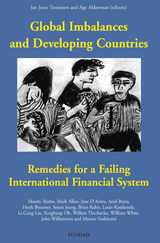Global Imbalances and Developing Countries: Remedies for a Failing International Financial System
|
Contributing authors:
Martín Abeles,
Mark Allen,
Jane D' Arista,
Henk Brouwer,
Ariel Buira,
Seeun Jeong,
Brian Kahn,
Louis Kasekende,
Li-Gang Liu,
Yonghyup Oh,
Jan Joost Teunissen,
Willem Thorbecke,
William (Bill) White,
John Williamson,
Masaru Yoshitomi
Editors: Jan Joost Teunissen and Age Akkerman Summary
The abrupt unwinding of global imbalances is a major risk for the world economy; it affects countries across the globe, but is particularly harmful to developing countries. This second volume on global imbalances includes an unorthodox, long-term view on global imbalances, an in-depth discussion about the role of the IMF, and a discussion about the need for reform of the international monetary and financial system. It pays special attention to Africa and East Asia. Recalling that the US current account deficit -- which accounts for 70 percent of the world sum of current account deficits, hence absorbs 70 percent of net available global saving -- lies at the heart of the problem, the contributing authors stress that the present global imbalances cannot be sustained indefinitely. The authors suggest various remedies, ranging from capital market integration in East Asia to the creation of an international clearing agency that would serve as the institutional platform for a new global payments system. Some authors question the viability of far-reaching reform proposals while others stress the need for designing challenging remedies -- not only for the sake of anticipating a breakdown in the world financial system but also because the current system (or non-system as some call it) can benefit from ideas for improvements. Quotes
“There are serious concerns about how the unwinding of global financial imbalances might affect the external financing conditions in which emerging market economies operate.” Louis Kasekende, African Development Bank “It is only when we find ourselves in a real systemic crisis that we tend to move towards global solutions. This implies that the longer the global imbalances continue in a benign way, the more complacent we are likely to be.” Brian Kahn, South African Reserve Bank “Perhaps the most important message of these earlier thinkers is that policymakers should try to avoid the build-up of dangerous economic imbalances in the first place.” William White, Bank for International Settlements “The IMF should assume a central role in the resolution of global imbalances.” Ariel Buira, G-24 and Martín Abeles, CEFID-Argentina “The need for the power to change the availability of liquidity at the global level has been increasingly evident throughout the post-Bretton Woods era as crisis after crisis has underscored the inadequacy of the current institutional framework.” Jane D’Arista, Financial Markets Center Contents
Contents, Abbreviations & Notes on Contributors
1 Introduction
2 Global Imbalances and the Implications for Africa
3 East Asia’s Role in Resolving the New Global Imbalances
4 An African Perspective: Comments on Yoshitomi, Liu and Thorbecke
5 Rebalancing Savings-Investment Gaps in East Asia
6 The Need for a Longer Policy Horizon: A Less Orthodox Approach
7 Global Imbalances and the Role of the IMF
8 Global Imbalances and the Role of the IMF: A Comment on Ariel Buira and Martín Abeles
9 The Future of the International Monetary System
10 A More Balanced International Monetary System
11 Reforming the International Monetary System: Comments on Jane D’Arista and John Williamson
12 A Response to the Comments of Henk Brouwer |
 € 15,-
Order now
June 2007 |










 Download Book as PDF
Download Book as PDF